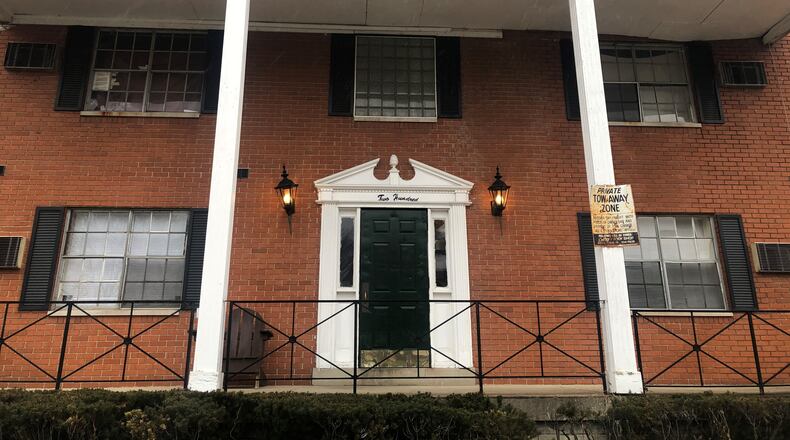Local housing advocates say a surge in cases could still come because moratoriums eventually will expire and many people will not be able to pay the rent they owe.
A bill President Donald Trump signed late last month extends a CDC moratorium on evictions through the end of January and provides much-needed rental assistance, said Matthew Currie, managing attorney with Advocates for Basic Legal Equality, which provides eviction defense assistance.
But Currie said a “perfect storm” is brewing for renters because tenant protections will come to an end as the coronavirus continues to rapidly spread.
Some people think an eviction epidemic has been delayed ― not solved.
“Ohio may be facing the most severe housing crisis in its history,” Currie said.
No surge. For now.
Since the start of the coronavirus crisis, some housing advocates have warned about a coming tidal wave of evictions. So far, that has not happened.
Dayton Municipal Court recorded 1,642 new eviction filings through late December, which is down more than 36% from 2019. Other courts across the state also have reported a decrease in cases.
But some people believe this trend is temporary.
Currie said the worst pandemic in a century and the worst recession in recent history is squeezing low-income renters, many of whom were spending more than half their monthly income on housing even before this crisis.
And this is concerning since economic conditions have deteriorated during the outbreak.
Many people remain out of work or have someone else in their household who is now unemployed.
Some workers are earning less after having their hours or wages cut.
Though lawmakers have approved some extended unemployment benefits, the payments often fall short of laid-off workers’ previous earnings.
New support
Trump signed a new stimulus bill that provides $25 billion for rental assistance and extends the CDC moratorium on evictions.
The previous coronavirus economic relief bill, the CARES Act, provided money for rental assistance, but those funds were running out, said Bill Faith, executive director of the Coalition on Homelessness and Housing in Ohio.
This new money hopefully will help hundreds of thousands of Ohio households avoid being evicted in the new year, he said.
Ohio is expected to receive more than $778 million in emergency rental assistance, which generally can cover up to 12 months of upcoming or back rent, Faith said.
“Some members of Ohio’s Congressional delegation were really critical to making sure this bill didn’t leave tenants out in the cold during this pandemic winter,” he said.
CARES Act money helped many people in the Dayton area stay in their homes during the pandemic.
Miami Valley Community Action Partnership (CAP) has provided about $7 million in rental assistance since June 1, said Lisa Stempler, president and CEO of the Dayton-based agency.
In comparison, the agency provided $138,000 in rental assistance last year.
The need vs. the resources
Miami Valley CAP has helped about 2,500 households with rental assistance, and about 5,500 more on waiting lists. The average amount of assistance is nearly $3,000.
About 1,486 applicants in Miami Valley CAP’s online portal indicated they received a three-day eviction notice from their landlords or were already in the process of being evicted, Stempler said.
But the agency says it was unable to serve about 4,428 households that sought help.
Some applicants did not qualify. But Stempler said mainly the current funding was insufficient to meet the community need.
“We have provided some $7 million in assistance since June 1 but the need is still extraordinary,” the agency said.
The $25 billion for rental assistance is expected to be sent to states for distribution. It’s unclear how much could be allocated to this region.
Miami Valley CAP says it hopes to receive funding so it can continue processing and approving rental assistance applications, which are considered on a first-come, first-served basis.
Court representation
Advocates for Basic Legal Equality (ABLE) has represented renters in court during the pandemic with the support of CARES Act grant funding, said Currie, the group’s managing attorney.
Tenants have a better shot of avoiding eviction if they have legal counsel who understand the law and tenants’ rights and can make the strongest case on behalf of their clients, officials say.
Tenants were able to stay in their homes and the eviction actions against them were dismissed in 95% of the cases handled by ABLE involving nonpayment of rent, Currie said.
Legal representation of tenants will be even more critical in 2021, Currie said, but ABLE’s funding has been reduced next year because of the pandemic.
Currie said ABLE needs and is seeking additional funds to continue eviction defense work because these are high-stake cases.
He said the consequences of removal include homelessness and housing instability and overcrowding, which make it very difficult to follow COVID-19 safety protocols, like social distancing and self-quarantining.
About the Author




